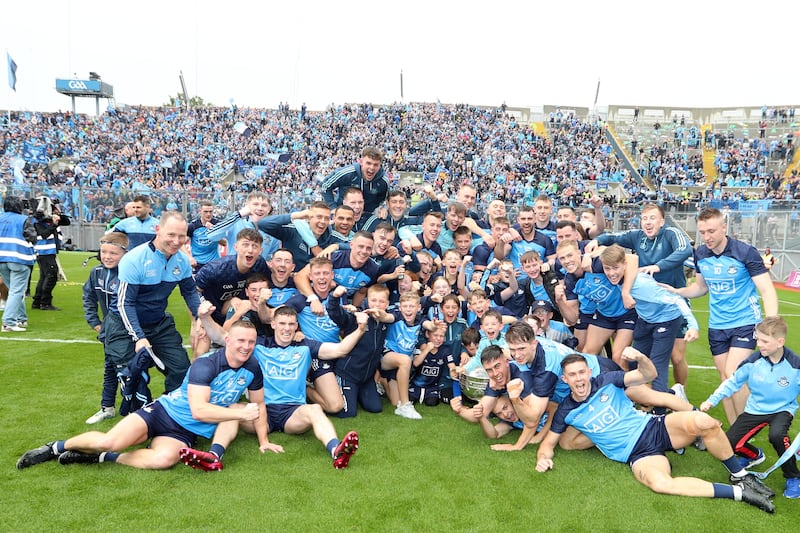BRENDAN Rogers could easily have dipped the head and walked on past the couple of journalists hoping to grab a word. After the devastation of All-Ireland semi-final defeat to Galway, no judgment would have been cast.
Coming into the game off a breathtaking campaign, the Derry full-back endured a day of mixed fortunes at Croke Park – starting like a house on fire as he sauntered upfield to slide over two classy scores, only for his man, Damien Comer, to exact revenge with the brace of brilliantly-taken second half goals that effectively finished the Oak Leafs.
The journey had to end somewhere; Derry wanted it to be on July 24 with the Sam Maguire in tow as they headed back to the north-west. Instead, introspection awaits in the weeks and months ahead.
For Rogers, as well as fellow Slaughtneil dual stars Chrissy McKaigue and Shane McGuigan, it was a second All-Ireland semi-final defeat this year, coming seven months after the Emmet’s hurlers lost out to eventual champions Ballygunner.
As was the case when heading for the bus that January day at Parnell Park, Rogers dropped his kitbag to the floor at Croke Park late on Saturday evening and tried to make sense of a disappointment that was still so raw.
“Probably, in hindsight, we rued a few chances we didn’t take in the first half to give us that bit of a gap, and then at the start of the second half when they had their spell, they made it count,” said the 28-year-old.
“It was very hard to get a bit of momentum again, and given the gap they had, I suppose they could suck us in a bit more, they got more turnovers and the game went in their favour...
“A lot of the first half is about finding your feet in a game like that, there’s always an edge or an atmosphere about it that takes a few minutes to get over. Look, Galway were very much better in the second half, there’s no two ways about it.
“That’s a hard pill to swallow, but it’s the way it is.”
Some of the post-match focus has centred on Odhran Lynch’s advances out the field as Derry tried to close the gap, with the Magherafelt ’keeper caught in no man’s land as Comer fired into an empty net from 30 metres for the Tribe’s second goal.
Lynch isn’t the first to have the spotlight shone upon him, and Rogers insists that is the chance you take when trying to find a way back into a game that is slipping from your grasp.
“It’s one of those things, it’s a risk-reward and you take the risk of trying to push on and get a few more scores.
“I suppose I was off him [Comer] a bit, I didn’t think it would break down the way it did and we got punished pretty heavily for it. That was the final nail in the coffin for us… it was a long road back at that stage.”
With over 68,000 crammed into Croke Park, it was the biggest crowd a Derry team has played before in some time and, with an All-Ireland place up for grabs, the stakes couldn’t have been any higher.
But the occasion, Rogers insists, had no part to play in a performance that failed to reach the high standard the Ulster champions set throughout the rest of the summer.
“No, you still get the same feeling out of it and you try and use the energy of it the same way you would at the Ulster final.
“I wouldn’t say it was a negative or anything like that, when we got our first couple of scores it was obviously a lift too. I’m sure it gave Galway a lift when they got their couple of goals as well...”
The challenge for Derry now is to maintain the high standard set under Rory Gallagher in 2022.
Before Saturday it had been 21 years since the county last appeared in an All-Ireland semi-final, but Rogers believes firm foundations have been laid for that progress to be built upon – even if lessons must be learnt from Saturday’s defeat.
“You put in the effort to try and get to this level - now we understand to some extent what it takes to get here, and we can only build on that.
“There’s no point in looking back and saying we’ll leave it here, leave it another 20 years… that’s just not the way we want to be. We want to set the standard that this becomes normal but, look, you have to learn some hard lessons along the way and this is another one we have to learn from.
“The Galway game during the league, we learned a lot from that and we progressed, but this will be another step where we have to look at ourselves and improve again.
“We just have to broaden our horizons, styles of play and things like that, and how we work on maybe adapting in-game. What we worked on the first half worked really well but when it didn’t go so well, we maybe didn’t change it quick enough to try and manage it.
“There’s obviously small things, it’s not like we’re going to reinvent the wheel or anything, but definitely some things to take away. You take positives but you also have to be critical.”







